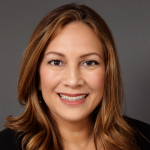 The industry event anyone in secured finance attends now celebrates its 77th year. SFNet is set to make the Arizona convention a memorable one. Click below to register.
The industry event anyone in secured finance attends now celebrates its 77th year. SFNet is set to make the Arizona convention a memorable one. Click below to register.

Tinamarie Feil
Co-Founder, Majority Shareholder, BMC Group
Biography:
Tinamarie is celebrating her 21st year as co-founder and majority shareholder of BMC Group, an international information management firm that leverages technology to deliver award winning secure, cloud-based, content management solutions. An innovator, frequent author and speaker, she brings experience in corporate compliance, stakeholder communications, insolvency case administration, and the due diligence process in major merger & acquisition transactions. With offices in North America, Asia and Europe, she manages to conduct business, and as a bonus, do what she loves, travel.
Tinamarie currently sits on the Board of the New York Institute of Credit, acts for the International Women’s Insolvency and Restructuring Confederation as committee director liaison to the United Nations Committee on International Trade Law, is a member of the International Board of the American Bankruptcy Institute, and acts on the Editorial Board of American Law Journal’s Bankruptcy Strategist. In addition, acting as foundational alumna for the University of Washington Department of Communication’s Career Exploration NYC, and as a past board member of both Step Up Women’s Network and Kids Company, her personal interests focus on bringing educational and career opportunities to under-served children and young adults. Other favorite organizations include Futures and Options and Minorities in Restructuring and Alternative Investments.
What advice would you give women just starting out in the industry?
Have a picture of what’s important to you both personally and professionally. It is definitely ok to “want it all.” Now, in my 50s, I feel like maybe I missed the opportunity to start a family because I was so focused on building my company. Believing in yourself and constantly visualizing success helps make your picture a reality. Taking action is obviously more important than visualization. Consider choosing a role model/mentor who has accomplished those things you visualize in your own success picture. The following recommendations apply to work as well as personal life. Listen, learn, ask questions and engage so that others know you’re interested in what you’re doing and that you want to bring value to the initiative. Strive to operate outside your comfort zone. If you struggle outside your comfort zone, then the lessons learned add to your depth of experience. When you succeed, the sense of accomplishment is extremely satisfying. Be mindful that how you present yourself, how you interact and the people with whom you choose to develop relationships will be central to the development of your personal brand. Find people who are interested in supporting your success. Opportunities most often arise out of relationships. This is also why networking should be a priority (even if it’s outside your comfort zone). One other thing I find incredibly important: the practice of acknowledging receipt of a request or inquiry and setting an expectation of when you’ll be able to address or deliver. If necessary, seek clarification. This activity alone eliminates uncertainty on both sides of a communication. This is as true with a significant other as well as a business counterpart!
Studies have shown women are more reluctant to tout their accomplishments in the workplace. What advice would you give to help women be more comfortable with speaking up?
If you don’t advocate for yourself, you may not be considered for opportunities you actually deserve! Most people who attain goals such as promotions, raises, and funding, do so by speaking of their accomplishments and convincing others of their value. Talking up accomplishments brings visibility for opportunities, acknowledgements and rewards. One way to get comfortable with speaking up on your own behalf is to have a story that includes your accomplishment. Practice telling the story and be ready to deliver it when discussions allow. Consider applying for awards and recognition; these kinds of opportunities are typically done in writing. Finally, if you are an expert in something, take the opportunity to become known as an expert by participating on panels, writing articles or starting an experts group.
How have you turned a failure in the workplace into a positive situation?
Early on in building my company, I was very hard on myself and team members if mistakes were made in client deliverables. My business partner helped me understand that failures and mistakes of all kinds are made every day by all levels of people in every business. How one responds and recovers is key. Taking accountability, understanding how something occurred and taking action to ensure the same situation isn’t repeated goes a long way in making everyone comfortable to move forward with positivity. I know that failures are not intentional. So, from a management approach, while we do ask our people to engage in the responsive actions I mentioned above, we like to say, “Look, it’s not your fault; it’s just your turn.” It lightens the severity of the conversation and lets people breathe a sigh of relief and go on.
77th Annual Convention
 The industry event anyone in secured finance attends now celebrates its 77th year. SFNet is set to make the Arizona convention a memorable one. Click below to register.
The industry event anyone in secured finance attends now celebrates its 77th year. SFNet is set to make the Arizona convention a memorable one. Click below to register.
